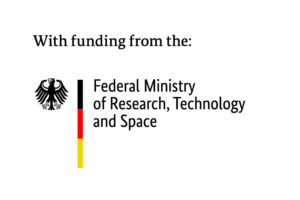
INDI - INFORMED BY INFLUENCERS
- Automation and Datafication of Communication
- Active
- Research project
- Duration: 2024 – 2027
- Project lead: Prof. Dr. Cornelius Puschmann
The project Informed by Influencers (INDI) focusses on the way in which knowledge relevant to climate change is disseminated and consumed on social networks. The aim is to determine the proportion of social media posts on this topic and to examine the behaviour of users. In short, we want to answer the question of the extent to which social media posts on the topic of climate change increase the level of information among viewers.
We want…
- create an understanding of the extent to which social media creates the basis for knowledge transfer.
- find out to what extent science communication is regularly consumed by users.
We are always happy to exchange ideas with anyone interested or to collaborate with scientists and journalists. You can find the contact details on our profile pages.

THE BACKGROUND
With INDI, we want to emphasise social understanding and the possibilities of social media platforms in the communication of knowledge, ideas and information and thus also pay more attention to the reality of life and the commitment of many people in Germany.
On the other hand, climate change and the measures associated with it are an important, much-noticed and frequently discussed topic, which is not only reflected in protests, parliamentary debates and court judgements, but is also reflected on social media. With our project, we want to contribute to a better understanding of discussions and opinion-forming on digital platforms.
THE CONTEXT
The internet and social media are crucial for today’s public communication. The digital media shift is ushering in the transformation of science communication and brings with it various challenges for science, politics and media, such as fragmented information landscapes, the rise of audiovisual platforms such as Instagram, YouTube and TikTok are becoming increasingly important for knowledge dissemination, but the visibility of content depends on algorithm-driven, non-transparent criteria.
THE TOPIC
Climate change is a global scientific and social topic. Special communication aspects are required to deal with the topic effectively. The discussion about climate change is strongly linked to the social and economic consequences of the process. This leads to an instrumentalisation and politicisation of the topic, which populist actors know how to use strategically.
NEW OPPORTUNITIES
In this context, science communication has the potential to overcome challenges through accessibility, clarity and public participation. The new media are breaking up existing structures and increasing participation in traditional science journalism. On the other hand, the diversity of communicators and their increasing algorithmisation based on social media engagement raise significant questions about disinformation.
USER GENERATED CONTENT
In addition, our usage habits are changing fundamentally in terms of news and information. Platforms such as Instagram, YouTube and TikTok not only offer entertainment, but are also important sources of news on socio-political topics. Although traditional mass media still play an important role in social media due to their popularity, user-generated content and influential communicators are important sources of information. Nevertheless, little attention has been paid to them as mediators of political information in research.
THE GOAL
The research project Informed by Influencers? (INDI) research project addresses these gaps. The project aims to systematically and quantitatively analyse the digital media use of online-informed people in Germany on the topic of climate change, with a special focus on Instagram, YouTube and TikTok. The project uses a range of innovative computer-assisted data collection methods and surveys, in particular digital behaviour tracking and computer-assisted analyses of audiovisual content. The study’s approach aims to shed light on the relationship between media use on the topic of climate change and users’ knowledge, attitudes and intentions by addressing phenomena such as the growing importance of audiovisual platforms as a source of information, the increasing relevance of non-traditional communicative actors, the lack of transparency of algorithmic interventions and inaccurate methods due to the incomplete collection of user behaviour data through surveys.

THE WAY OF RESEARCH
At INDI, we combine innovative methods that help us to record the viewing of climate-relevant content on social media platforms as comprehensively as possible. We use automated recording of user behaviour using mobile tracking in combination with new methods of automated data, audio and video analysis and link the insights gained with the participants’ survey data. The added value of the individual methods is increased by their combination and enables us to obtain a better and more accurate picture.
MIXED METHODS
The mixed-method approach is a research method that combines different techniques to gain a more comprehensive understanding of a phenomenon. Instead of using just one method, such as surveys alone, the mixed-method approach integrates several approaches. The combination allows researchers to utilise the strengths of different methods and complement their findings. This makes it possible to delve deeper into a topic, look at different perspectives and draw more robust conclusions.
QUESTIONING
Online surveys via smartphone, also known as the Experience Sampling Method (ESM), enable researchers to collect data on people’s usage and experience. With this method, participants can be regularly asked to answer short questions as they go about their daily lives.
MOBILE TRACKING
Mobile tracking apps are applications that provide information about the use of smartphones. They record data such as screen time, i.e. the time the screen is active, as well as the use of certain apps. They can also track predefined events or actions on the smartphone, such as opening a specific app or reaching a specified notification. These apps provide valuable insights that can help to understand user behaviour.
AUDIOVISUAL DATA ANALYSIS
There is a whole range of audiovisual data analysis methods that enable the automated analysis of videos and audio files. In our case, we use these methods to analyse TikTok videos, YouTube shorts and Instagram reels, for example, to determine whether climate change is addressed in the videos and how the topic is discussed. To this end, we examine various aspects of the video, such as the spoken word, the visible text, the scenarios depicted and the content, and try to recognise recurring patterns.

DATA PROTECTION & PRIVACY
The INDI project team is aware of the sensitivity of the data and the importance of protecting the privacy of the participants. Accordingly, we have developed and implemented several measures to ensure the protection of data and privacy.
PSEUDONYMISATION
Participants receive an ID (pseudonym). In this way, we can separate the tracking and survey data from the identity data. We use the term identity data to refer to data that enables participants to be directly identified (e.g. name, contact details, email).
This identity data is stored separately from other data on secure servers. The research team does not have direct access to this identity data. In this way, the tracking or survey data collected cannot be directly assigned to any individual.
YOU STAY IN CONTROL
Participants have the opportunity to withdraw their consent during the entire data collection process. In this case, all data collected will be destroyed. In this way, the participants retain control over their data.
WE DO NOT KEEP ANY IDENTITY DATA
Once data collection is complete, all participant identity data (contact details, email, etc.) will be deleted. From this point onwards, it is not possible to assign the survey and tracking data to a specific person.
DATA MANAGEMENT
The data management concept ensures that the data can only be accessed by authorised team members and is not subject to commercial use. The servers are located in Germany, which ensures stricter compliance with data protection laws. Any disclosure of the data is exclusively for scientific purposes and after prior anonymisation in order to protect the privacy and confidentiality of the data.

Funded by the Federal Ministry of Research, Technology and Space (BMFTR)

